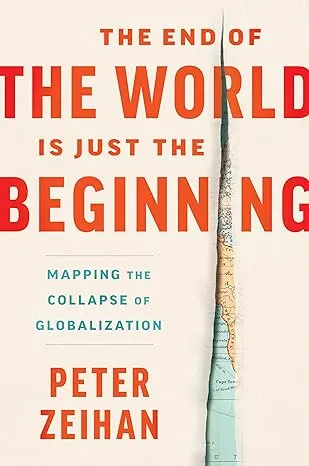About this book
Five Key Takeaways
- Globalization is collapsing, leading to local self-sufficiency.
- Demographic shifts will create significant economic and social challenges.
- Transportation systems are fragile, impacting global economic stability.
- Food security is crucial for political stability and survival.
- Manufacturing must innovate to thrive in a localized economy.
-
Globalization Is Already Ending
The world is witnessing the collapse of globalization, caused by shifting demographics and economic instability (Chapter 1).
This decline forces nations to focus on self-reliance, as global supply chains crumble and interdependent economies falter.
Without the support of global markets, countries must adapt to producing goods locally, which often proves costly and challenging.
This shift impacts everything from food security to energy production, stressing the need for sustainable resource management.
As societies pull back into localized systems, cultural and economic exchanges significantly diminish, slowing innovation.
The collapse of globalization could lead to increased economic volatility as nations struggle to meet their internal needs.
Without interconnectivity, countries will face complex challenges in maintaining stability, making cooperation more vital than ever.
The end of globalization not only reshapes economies but also alters the very framework of societal interaction worldwide.
-
Demographics Will Reshape Economies
Demographic shifts—declining birth rates and aging populations—are dramatically altering economies worldwide, shrinking workforces and impacting growth potential.
This problem is especially severe for countries like Japan and China, facing steep population declines and growing economic burdens.
Fewer young workers means reduced productivity, slower innovation, and heavier economic pressure on younger generations supporting retirees.
The U.S., with a relatively favorable demographic trend, may experience fewer disruptions but still faces workforce challenges in decades to come.
The author argues that countries must implement innovative policies, like incentivizing family growth or promoting immigration, to address these shifts.
Creating systems that sustain economies with smaller younger populations requires rethinking labor practices and expanding adaptive strategies.
Supporting these policies with financial incentives and improved social frameworks is essential to counter demographic decline.
Nations that fail to adapt to these realities could face severe economic stagnation and deepened societal inequalities.
-
Localize Supply Chains for Resilience
With global supply chains faltering, industries must prepare to operate in economically localized systems.
Actionable changes include shortening supply chains, producing closer to consumer bases, and adopting flexible manufacturing models.
Focusing on nearby resources and markets will reduce dependence on vulnerable international networks and improve long-term sustainability.
This approach is vital to mitigate disruptions caused by geopolitical instability, natural disasters, or economic volatility.
Localized supply chains improve responsiveness, lower logistical risks, and strengthen ties to local economies.
Despite initial logistical costs, this adaptation positions companies as resilient and adaptable in uncertain times.
Neglecting this advice could lead to catastrophic breakdowns, weakening industries reliant on failing global networks.
-
Oil Supply Chains Are Precarious
Global oil production faces instability, largely due to geopolitical tensions and the U.S.'s reduced role in securing oil trade (Chapter 5).
The transportation of oil often involves volatile regions like the Persian Gulf, making routes vulnerable to conflict or disruption.
The decline of international oversight exacerbates risks and strains countries relying on consistent oil supplies for energy security.
Disruptions in global oil markets could lead to economic collapses in nations without diversified energy sources or stable reserves.
A steadily decreasing reliable oil supply underscores the need for alternative energy development and energy independence.
Such disruptions have far-reaching impacts, destabilizing economies and heightening international competition for limited resources.
Countries must prepare for a post-oil era by investing in renewable energy and restructuring energy policies to reduce reliance on imports.
Failing to adapt could render nations highly vulnerable to energy shortages and economic crises.
-
Food Security Is a National Priority
Food systems are alarmingly fragile, and disruptions to agriculture or supply chains can trigger catastrophic societal consequences.
Historical collapses of governments due to food shortages stress the need for robust systems ensuring continuous food availability.
Unlike durable goods, food is highly perishable, making sustained supply even more critical for population stability.
The author highlights that food shortages lead more rapidly to social unrest and political instability than wars or diseases.
Countries must prioritize strengthening domestic agriculture, diversifying food production, and improving storage and distribution systems.
A localized approach ensures resilience against unforeseen disruptions, safeguarding populations from scarcity-driven crises.
Sustainable food systems are foundational to stable economies and thriving societies, especially in a deglobalized world.
Failure to act on food security could create humanitarian disasters, with cascading impacts on economic and political systems.
-
Prepare for Demographic Shifts
Nations need solutions for decreasing working-age populations and the challenges caused by rapidly aging societies.
Encourage immigration, incentivize family growth, and promote workforce re-training to counter declining birth rates and aging demographics.
Develop policies prioritizing economic inclusivity across generations while increasing automation and workforce adaptability.
This strategic approach ensures that shrinking populations don’t hamper productivity or economic progress.
These policies can alleviate fiscal strain, balancing the resources required for pensions and healthcare amid rising retirements.
Adjusting to demographic changes positions nations to avoid economic stagnation typical of aging societies.
Ignoring demographic policies could deepen stagnation, lift dependency ratios, and erode societal stability.
-
Manufacturing Will Localize
Global manufacturing is undergoing a fundamental shift, transitioning from global supply chains to localized production (Chapter 7).
This change is fueled by the risks posed by complex global logistics, which often collapse under strain.
Localized manufacturing reduces these vulnerabilities by producing closer to end-users, streamlining processes and lowering logistical risks.
Traditional mass production strategies are being replaced by dynamic models combining large-scale and small, specialized facilities.
This decentralization prioritizes speed and adaptability over economies of scale, vital in a volatile global landscape.
While advanced manufacturing technologies could mitigate costs, the loss of global collaboration may slow technological growth.
The workforce must evolve too, emphasizing high-skilled over low-skilled labor to meet production demands.
Localized and flexible manufacturing will define the next industrial era, ensuring resilience in an uncertain world.




















